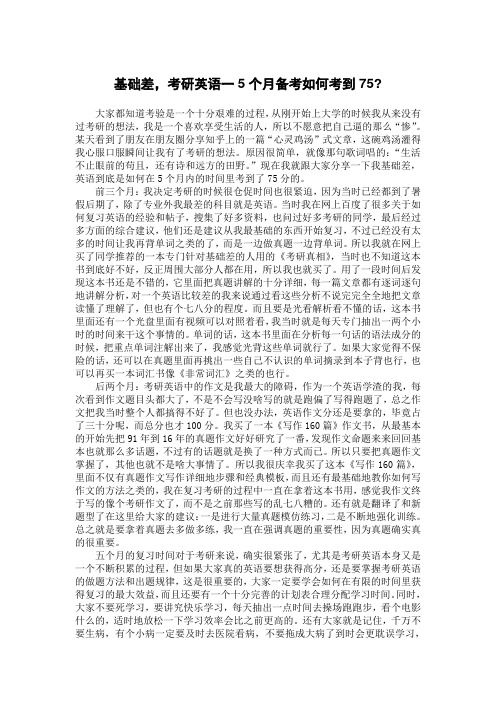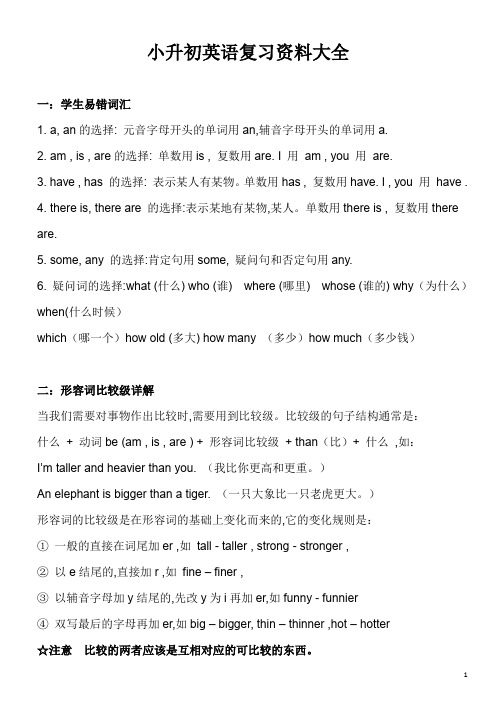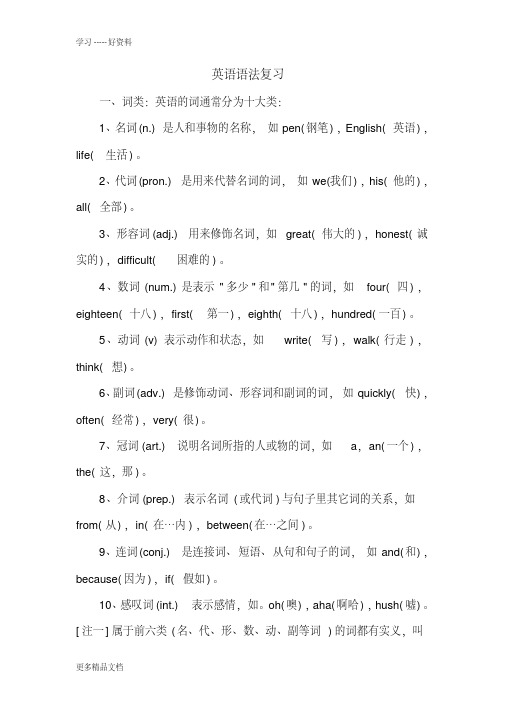英语一复习资料(1)汇编
- 格式:pdf
- 大小:40.43 KB
- 文档页数:6

基础差,考研英语一5个月备考如何考到75?大家都知道考验是一个十分艰难的过程,从刚开始上大学的时候我从来没有过考研的想法,我是一个喜欢享受生活的人,所以不愿意把自己逼的那么“惨”。
某天看到了朋友在朋友圈分享知乎上的一篇“心灵鸡汤”式文章,这碗鸡汤灌得我心服口服瞬间让我有了考研的想法。
原因很简单,就像那句歌词唱的:“生活不止眼前的苟且,还有诗和远方的田野。
”现在我就跟大家分享一下我基础差,英语到底是如何在5个月内的时间里考到了75分的。
前三个月:我决定考研的时候很仓促时间也很紧迫,因为当时已经都到了暑假后期了,除了专业外我最差的科目就是英语。
当时我在网上百度了很多关于如何复习英语的经验和帖子,搜集了好多资料,也问过好多考研的同学,最后经过多方面的综合建议,他们还是建议从我最基础的东西开始复习,不过已经没有太多的时间让我再背单词之类的了,而是一边做真题一边背单词。
所以我就在网上买了同学推荐的一本专门针对基础差的人用的《考研真相》,当时也不知道这本书到底好不好,反正周围大部分人都在用,所以我也就买了。
用了一段时间后发现这本书还是不错的,它里面把真题讲解的十分详细,每一篇文章都有逐词逐句地讲解分析,对一个英语比较差的我来说通过看这些分析不说完完全全地把文章读懂了理解了,但也有个七八分的程度。
而且要是光看解析看不懂的话,这本书里面还有一个光盘里面有视频可以对照着看,我当时就是每天专门抽出一两个小时的时间来干这个事情的。
单词的话,这本书里面在分析每一句话的语法成分的时候,把重点单词注解出来了,我感觉光背这些单词就行了。
如果大家觉得不保险的话,还可以在真题里面再挑出一些自己不认识的单词摘录到本子背也行,也可以再买一本词汇书像《非常词汇》之类的也行。
后两个月:考研英语中的作文是我最大的障碍,作为一个英语学渣的我,每次看到作文题目头都大了,不是不会写没啥写的就是跑偏了写得跑题了,总之作文把我当时整个人都搞得不好了。

2016年高考试题分项解析之专题1 词、短语辨析(名词、动词、形容词、副词、代词和介词)1.【2016·江苏】24. _________ —Can you tell us your for happiness and a long life?—Living every day to the full, definitely.A. recipeB. recordC. rangeD. receipt【答案】A【解析】试题分析:考查名词词义辨析。
名词recipe秘诀,食谱,药方;record记录;range范围;receipt 收据,收条;句意:—你能告诉我你对幸福长寿的秘密吗?—当然是尽情享受每一天。
根据句意可知A项意为“秘诀”,与上下文相符。
考点:考查名词辨析2.【2016·江苏】25. He did not easily, but was willing to accept any constructive advice for a worthy cause.A.approachB. wrestleC. compromiseD. communicate【答案】C考点:考查动词词义辨析3.【2016·江苏】30.Many businesses started up by college students have________thanks to the comfortable climatefor business creation.A.fallen offB. taken offC. turned offD. left off【答案】B【解析】试题分析:考查动词短语辨析。
短语fall off跌落,下降;take off起飞,成功,受欢迎;turn off 关闭;leave off停止,中断;句意:由于良好的创业环境,很多大学生创办的生意都很成功。
根据句意可知B正确。

Day 11.alter v.改变,改动,变更2.burst v i./n.突然发生;爆裂3.dispose v i.除掉;处置;解决;处理(of)4.blast n.爆炸;气流v i.炸,炸掉5.consume v.消耗,耗尽6.split v.劈开;割裂;分裂adj.裂开的7.spit v.吐(唾液等);唾弃8.spill v.溢出,溅出,倒出9.slip v.滑动,滑落;悄悄疾行;溜10.slide v.滑动,滑落n.滑动;滑面;幻灯片11.bacteria n.细菌12.breed n.种,品种v.繁殖,产仔13.budget n.预算v.编预算;作安排你应邀为你班黑板报的英语角写一篇短文,介绍著名物理学家斯蒂芬·霍金(Stephen Hawking)。
写作内容写作要求1.只能用5个句子表达全部内容;2.开头已给出,不计入总句数。
评分标准句子结构准确,信息内容完整,篇章连贯。
Stephen_Hawking,a_world-famous_scientist_with_a_strange_disease,is_the_son_of_a_research_biologist.He was born on January 8,1942 in Oxford,England.In March 1959,he was admitted to Oxford University and graduated 3 years later.In July 1965,Hawking married 21-year-old Jane Wild who was a former student of Hawking’s.In 1979 he became a professor of mathematics at the University of Cambridge.In 1988,Hawking published his famous work A Brief History of Time.。


1 小升初英语复习资料大全 一:学生易错词汇 1. a, an的选择: 元音字母开头的单词用an,辅音字母开头的单词用a. 2. am , is , are的选择: 单数用is , 复数用are. I 用 am , you 用 are. 3. have , has 的选择: 表示某人有某物。单数用has , 复数用have. I , you 用 have . 4. there is, there are 的选择:表示某地有某物,某人。单数用there is , 复数用there are. 5. some, any 的选择:肯定句用some, 疑问句和否定句用any. 6. 疑问词的选择:what (什么) who (谁) where (哪里) whose (谁的) why(为什么)when(什么时候) which(哪一个)how old (多大) how many (多少)how much(多少钱)
二:形容词比较级详解 当我们需要对事物作出比较时,需要用到比较级。比较级的句子结构通常是: 什么 + 动词be (am , is , are ) + 形容词比较级 + than(比)+ 什么 ,如: I’m taller and heavier than you. (我比你更高和更重。) An elephant is bigger than a tiger. (一只大象比一只老虎更大。) 形容词的比较级是在形容词的基础上变化而来的,它的变化规则是: ① 一般的直接在词尾加er ,如 tall - taller , strong - stronger , ② 以e结尾的,直接加r ,如 fine – finer , ③ 以辅音字母加y结尾的,先改y为i再加er,如funny - funnier ④ 双写最后的字母再加er,如big – bigger, thin – thinner ,hot – hotter ☆注意 比较的两者应该是互相对应的可比较的东西。 2

英语语法复习一、词类:英语的词通常分为十大类:1、名词(n.)是人和事物的名称,如pen(钢笔),English(英语),life(生活)。
2、代词(pron.)是用来代替名词的词,如we(我们),his(他的),all(全部)。
3、形容词(adj.)用来修饰名词,如great(伟大的),honest(诚实的),difficult(困难的)。
4、数词(num.)是表示"多少"和"第几"的词,如four(四),eighteen(十八),first(第一),eighth(十八),hundred(一百)。
5、动词(v)表示动作和状态,如write(写),walk(行走),think(想)。
6、副词(adv.)是修饰动词、形容词和副词的词,如quickly(快),often(经常),very(很)。
7、冠词(art.)说明名词所指的人或物的词,如a,an(一个),the(这,那)。
8、介词(prep.)表示名词(或代词)与句子里其它词的关系,如from(从),in(在…内),between(在…之间)。
9、连词(conj.)是连接词、短语、从句和句子的词,如and(和),because(因为),if(假如)。
10、感叹词(int.)表示感情,如。
oh(噢),aha(啊哈),hush(嘘)。
[注一]属于前六类(名、代、形、数、动、副等词)的词都有实义,叫做实词(notional word)。
属于后四类(冠、介、连、感等词)的词没有实义,叫做虚词(form word)。
[注二]不少词可以属于几个词类,如work(工作;动词和名词),fast(快;形容词和副词),since(自从;连词和介词)等。
二、句子成分(主谓宾定状补)1、主语主语表示句子主要说明的人或事物,一般由名词,代词,数词,不定式等充当。
He likes watch TV.2、谓语谓语说明主语的动作,状态或特征。
人教版七年级下册英语期末复习知识点总结汇编人教版七年级下册英语期末复知识点总结汇编Unit1 Can you play the guitar?一词形转换1.singv.唱歌singern.歌手singingn.歌唱2.swimv.游泳swimmern.游泳者swimmingn.游泳3.dancev.跳舞XXX.舞者dancingn.跳舞4.drawv.画画drawern.抽屉drawingn.图画5.XXX.说话XXX.发言者XXX发言6.writev.写writern.作家writingn.写作7.XXX.小提琴violinistn.小提琴手8.XXX.钢琴pianistn.钢琴家9.musicn.音乐musiciann.音乐家10.XXX.教XXX.教师二、短语及用法1.play the +西洋乐器play the XXX……play +球类/活动play XXX2.XXX讲英语XXX讲故事talk to/ with sb.和某人交谈 3.be good at + doing XXX擅长做某事=do well in (doing )sthbe good for对……有好处反义:be bad for对……有坏处be good to sb.对……友好= be friendly tobe good with善于应付……的4.make XXX和某人交朋友5.stay at home待在家6.help sb。
with sth/ help sb。
(to )do XXX帮助某人做某事7.on the weekend = on weekends在周末XXX教某人做某事XXX什么俱乐部music XXX XXX10.want to do XXX想要做某事want sb。
to do XXX想要或人做某事11.like to do sth/ doing XXX喜爱做某事12.be free/busy有空/忙碌的13.call sb。
基础不好,考研英语一怎么复习 你还在为单词记不住烦恼吗?你还在为语法学不会而担忧吗?那你肯定也在为考试考不好而愤懑了。一切皆因基础不好,复习的话推荐《考研真相》,这本书很适合打基础。
《考研真相》这本书十分详细,专为基础薄弱者量身打造,逐句精解单词和语法,清晰透彻的解析,即使基础不好,也能一看就懂,一学就会。 一、 精解词汇,图解难句,基础知识速学会 《考研真相》里面的讲解很详细,它在很大程度上满足了基础薄弱者的切身需求,里面把阅读文章进行了超细讲解,词汇注释和句子解析都详细到史无前例的地步。 词汇注释有音标、词性、词义、近反义词和相关词组,甚至还有例句,为你节省了查字典的功夫,同时能让你更专心的做题。利用它可以在真题语境中学习单词,相比于用单词书学习单词,这种方法不会枯燥无味,而且效率很高。 句子解析给出了两种有利于基础不好的考生接受的方式,采用的是“图解+文解”的模式。长难句是句子图解,清晰直观;简单句是文字讲解,具体到位。无论是这两种方式的哪一种,跟着它们学习,你的语法知识会很快得到提升。结合语境来学习的方法,不会让你感到枯燥无味。 二、 定位答案,立刻掌握做题技巧 阅读的答案解析给出了四个版块,有选项表析、答案考点、定位与分析和干扰项分析。这四个板块构成了一个整套的答题思路,选项表析先是整体分析四个答案的基本特征、出处等;答案考点虽然简短,但是很明确的指出了考纲要求,有利于把握命题规律;定位与分析是把正确答案回归原文,让你可以找到出处,从而真正弄明白正确原因;干扰项分析可以教会你如何结合题干排除错误选项。 除此之外,你还能学到翻译和写作的做题技巧,也都讲解的很透彻,一看就懂,一学就会。即便你基础很差,也能一点就通。 三、 英汉左右对照,方便练习翻译 书中开创的"英汉对照"模式,将英语原文和汉语译文采取左右对照的形式进行排列,一方面方便考生查找汉语译文;另一方面,作为一个有机整体,有利于英语基础薄弱的考生从整体上理解文章语义。 在文章的翻译方面,为了照顾基础薄弱的考生,编者在原文的基础上,翻译直观、全面,尤其对于一些涵义晦涩或是模糊的句子。考生可以用它来练习翻译,可以自己先进行翻译,再对照文章的翻译。 四、 真题佳句,轻松积累写作素材 书中将真题文章中精彩、典型和实用的语句专门摘录出来,一方面对其特殊的语言结构予以技术性的分析,以方便考生在理解的基础上记忆和应用。 另一方面又仿照这些语言结构拟写了历年真题写作中常用的重点语句,考生可以学习并积累此类语言,学会把这些语言结构灵活运用到自己的写作中去。 历届学长学姐大力推荐的考研英语一辅导书 1.《非常词汇》 适合人群:英语一和英语二通用 推荐理由:800个句子浓缩所有大纲单词,通过句子记单词,让你不再由A背到Z,背单词不再那么枯燥, 记忆量大大变小了。赠送的4大赠本中,不仅包括考研英语必考词和基础词,还有四大赠本《高考词+四级词+六级词+考研词》、《基础词+必考词+偶考词+超纲词》,《750个考研高频短语》另外还有《300组词汇辨析》。重点分明,可以根据的自己的情况和时间进行选择去用 2.闪过英语考研《必考词汇应用全书》 适合人群:备考时间不足的人 推荐理由:闪过作为英语教辅第二品牌,为什么说闪过英语适合备考时间不足的人,因为闪过英语辅导 书都有“薄、准、精、快”的特点,让你在短期内闪过英语考试。 大家都知道必考词=考研英语70分,可见必考词是多的么重要,但是必考词的应用比记忆重要的多。这 本书不仅浓缩了1800个必考词,还给出了必考词常考的几大短语!这些短语帮你在 短期内搞定必考词在考试中的应用。 二、阅读: 1.《阅读基础90篇》 适合人群:英语基础薄弱的人 推荐理由 :通过90篇真题阅读的逐词逐句精解,夯实词汇和语法,在短期内恶补基础! 赠送书中还有8大考点的满分技巧帮助考生系统复习,再用赠送的36篇标准难度真题实战演练,检测成 果,适合复习前期恶补基础。 2.闪过英语考研《长难句闪过》 适合人群:备考时间不充足的人 推荐理由 :《长难句闪过》被称作“长难句破解神器”,这本书不仅仅是向我们展示语法分析的结果,而 教你通过“找主干,理清修饰词,看标点”三个步骤教你轻松简单的破解长难句,让你一看就懂,一做 就会,快速搞定长难句!如果长难句是你的障碍,那么这本书无疑是你最好的选择。 1.《考研真相》 适合人群:英语基础薄弱的人 推荐理由:逐词逐句逐题精解真题,把真题文章每句的难点词汇和语法掰开了揉碎了一句一句去讲,不用查字典,更不用查语法书,学长学姐们都大力推荐!这本书有两个版本,一个是基础加强版(98-07年真题)——适合第一阶段打基础、一个是高分突破版(08-17年真题)——适合第二阶段复习,适合基础薄弱的考研 党,适合自己的就是最好的! 2.《考研英语一历年真题汇编王》 适合人群:考前想要刷题的人 推荐理由:这本书汇编了历年的38套真题,适合在考前或者复习前期刷题用,这本书最大的特点就在于 题量大,还便宜。 四、写作 《写作160篇》——英语一写作专用书 适合人群:英语基础薄弱专用 推荐理由:这本书全面涵盖可考的话题,连续11次命中作文原题!话题重点突出(真题作文40篇+预测作文30篇+熟悉浏览90篇);教你搞定基础,通过词-句-段-篇层层推进,一步步教会你写作文!利用真题作文“三步作文法”(模板范文+思路创新+语言创新)教你写出好作文!这本书是大部分往届生都推荐的!
考点25 并列连词和并列句高考频度:★★★★★【命题解读】连词分为并列连词和从属连词两大类。
并列连词是连接主语与主语、谓语与谓语、句子与句子、分词与分词的词,它要求前后两部分有相同的形式和语法作用。
【命题预测】预计2021年高考对连词的考查主要集中在简单句、并列句和各种复合句的掌握上,尤其是对连词的选择与使用上,如:and, but, or, while等等。
【复习建议】1.掌握并列连词的基本用法;2.掌握并列连词的固定句型。
考向一并列句一、并列连词1.表示并列关系的连词:and: 可用来连接两个或两个以上的单词/短语或句子,表示一种顺接的关系。
We are singing and they are dancing.or:用于否定句中连接并列成分,表示"和,与";用于"祈使句+or+陈述句"中,意为"否则,要不然"。
The baby is too young. He can’t speak or walk.both…and:"两个都……",连接两个并列主语时谓语动词用复数。
Both Li Ping and Mary are going to the Great Wall tomorrow.either…or…:"要么……要么",连接的并列成分可在句中作主语、表语、宾语等。
连接并列成分作主语时,谓语动词通常与or后的部分保持一致。
Either she or I am right.neither…nor: "既不……也不……",连接的并列成分可在句中作主语、表语、宾语等。
连接并列成分作主语时,谓语动词通常与nor后的部分保持一致。
Neither he nor I am right.not only…but also: "不仅……而且……",强调后者;引导并列主语时,谓语动词与后面的主语保持一致。
Not only the students but also the teacher gives the money to our school.2. 表示转折关系的并列连词but "但是",所连接的成分意思相反或相对。
姓名分数()1.________ it is today!A. What fine weatherB. What a fine weatherC. How a fine weatherD. How fine a weather ()2. We will have a _________ holiday after the exam.A. two monthB. two-monthC. two month’sD. two-months()3.________ trees are cut down in the forests every year.A. ThousandB. ThousandsC. Thousand ofD. Thousands of()4. Our sports meeting will be held ________.A. on 24, Tuesday, AprilB. in April 24, TuesdayC. on Tuesday, April 24D. in April Tuesday 24 ()5. There is no enough ________ in the corner to put the table.A. placeB. roomC. floorD. ground()6. Some people like to stay at home, but ________ like to go to the cinema.A. anotherB. otherC. othersD. other one()7. -- Is this your shoe? -- Yes, but where is _________?A. the other oneB. other oneC. another oneD. the others()8. .Robert has gone to _________ city and he’ll be back in a week.A. otherB. the otherC. anotherD. any other()9 .– When shall we meet again next week? -- _______ day is possible. It’s no problem with me.A. EitherB. NeitherC. EveryD. Any()10.Have you ever seen ________ big panda before? A. a such B. such a C. so a D. a so()11.-- _______ do you write to your parents?-- Once a month.A. How longB. How soonC. How oftenD. How far()12.– Which book would you like to borrow? -- ________ of the two books is OK with me.A. EitherB. BothC. AnyD. None()13.He knows _________ English ________ French. But he’s very good at Japanese.A. either; orB. both; andC. neither; norD. either; nor()14. There are many trees on ________ side of the street. A. either B. any C. all D. both()15. Mrs. Lee teaches ________ math. We all like her. A. we B. us C. our D. ours()16.________ is the population of the city?A. How manyB. WhatC. How many peopleD. How much()17. Japan is ________ the east of China. A. in B. to C. on D. at()18. The postman shouted, ― Mr Green, here is a letter ________ you.‖ A. to B. from C. for D. of ()19. He has n’t heard from his friend ______ last month. A. since B. by the end of C. for D. until ()20. I’m going to look for another job ________ the company offers me more money.A. afterB. unlessC. whenD. for姓名分数()1. I wonder ________ they finished so many different jobs in such a short time.A. whyB. howC. whenD. where()2. -- Do you speak English? -- Yes, I speak _________ a little English _______ some French.A. neither, notB. both, orC. either, orD. not only, but also()3. ______ the maths problem is difficult, I’ll tr y very hard to work it out.A. ThoughB. WhenC. BeforeD. After()4. The accident took place ________ a cold February evening.A. onB. inC. atD. for()5. He turned ________ the radio a little because his father was asleep.A. onB. downC. upD. off()6.–Oh, it’s raining heavily. - Please don’t leave ________ it stops.A. whenB. afterC. sinceD. until()7. Jane said she would come here ________ 9:00 and 9:30 tomorrow morning.A. fromB. atC. betweenD. around()8. My father went to Shanghai yesterday. He ______ back in two weeks.A. comesB. has comeC. will comeD. came()9. -- _______ you ______ your book to the library? -- Yes. I returned it yesterday.A. Did, returnB. Have, returnedC. Will, returnD. Do, return()10. – Must I finish it now? -- No, you ________.A. mustn’tB. needn’tC. can’tD. shouldn’t()11. Though it’s cloudy now, it _________ get sunny later. A. can B. may C. must D. need ()12. It is in the library, you _______ talk loudly.A. may notB. can’tC. needn’tD. mustn’t()13. If you have lost a library book, you have to _________ it.A. find outB. look afterC. pay forD. take care()14. He will call me as soon as he _________ the city.A. reachesB. reachedC. will reachD. is reaching()15. The pen _________ him ten yuan. A. paid B. cost C. took D. spent()16. The train _________ for twenty minutes.A. leftB. has leftC. is leavingD. has been away()17. – How many books _____ they ______ last week?-Five. But they haven’t finished reading even one.A. did,borrowB. have,borrowedC. will,borrowD. do,borrow()18. He _________ his bike so he has to walk there. A. lost B. has lost C. had lost D. loses ()19. – Why did the policeman stop us? -- He told us not _______ so fast in this street.A. driveB. drivingC. to driveD. drove()20. The population of the world in 20th century became very much _________ than that in 19th.A. biggerB. largerC. greaterD. more姓名分数()1. The math problem is so hard that ________ students can work it out.A. a fewB. a littleC. manyD. few()2. He hardly had anything to eat, ________ he? A. didn’t B. hadn’t C. had D. did()3. –What’s the weather like tomorrow? -- The radio says it is going to be even ______.A. badB. worstC. badlyD. worse()4. Mr. King didn’t know _______ yesterday evening.A. when does his son come backB. when his son comes backC. when did his son come homeD. when his son came home()5. He never does his work _______ Mary.A. as careful asB. so careful asC. as carefully asD. carefully as()6. If it ________ tomorrow we’ll go to the park.A. will not rainB. doesn’t rainC. is not rainingD. didn’t rain()7.The radio the snow will stop late in the day. A. say B. says C. said D. talks ()8.The nurse told the children the sun ______ in the east.A. risesB. roseC. will riseD. has risen()9.Wenzhou is ________ the south of Zhejiang.A.toB. inC. onD. at()10. Would you please tell me ________ next, Mr Wang?A. what should we doB. we should do whatC. what we should doD. should do what()11. —What about Japanese cars? —The cars made in Japan are cheaper than______ made in America.A. onesB. thoseC. thatD. it()12. -It’s too hot. Would you mind ________ the door? -_________. Please do it now.A. to open, OKB. opening, Certainly notC. opening, Of courseD. to open, Good idea ()13. The magazines are ________easy that the children can read them well.A. suchB. soC. tooD. very()14. Could you please give me a _________? -I’ve missed the las t bus. no e on!A.rideB.callC.handD.five()15. I don’t know if he______ tomorrow.Please let me know if he________ .A. comes; comesB. will come; comesC. comes; will comeD. will come; will come ()16.-Shall we go to the concert tonight? -Sorry, I can’t ______the time for doing that.A. spendB. costC. affordD. pay()17. Did you enjoy the days_____ you spent in Beijing during the Spring Festival?A. thatB. whenC. whatD. where()18. The story was so funny that all of us couldn’t______ laughing.A. helpB. stopC. continueD. finish()19. —Why did you all go swimming ______Tom? —Because he was ill at home.A. withB. besidesC. exceptD. beside()20. —What’s your sister like? —She ___.A. is a workerB. likes pearsC. is very thinD. is like her father参考答案(1):1---5 A B D C B,6----10 C. ACDB,11----15CACAB,16---20BBCAB (2):1-5 BDAAB ,6—10 DCCBB,11—15 BDCAB,16—20 DABCB (3)1-5 DDDDC ,6-10 BBABC,11—15BBBAB,16—20 CAACC。
学习-----好资料更多精品文档大学英语复习资料Part 1. Communication skill. 1. --- Sorry, I can’t go shopping with you tonight. ---______D_____. A. Why don’t you ask Bill? B. Excuse me. Which is the way to the shop? C. It’s very kind of you D. That’s OK. Maybe some other time2.---You haven’t been to Beijing, have you? ---______D_____.How I wish to go there! A. Yes, I have B. Yes, I haven’t C. No, I have D. No, I haven’t3. ---I’11 be away on a business trip. Would you mind looking after my cat? ---Not at all, ________D___.A. I’ve no timeB. I’d rather noC. I’d like itD. I’d be happy to4. ---Would you do me a favor and give me a ride? ---_______D____.A. Yes, that’s right B. No trouble C. Never mind D. With pleasure5. ---How often does he come here to learn lessons from you? ---____C_______. A. Two days B. Two days later C. Once a weekD. In two days’ time6. ---Will you go skiing with me this winter vacation? ---It______B_____.A. all depend B. all depends C. is all depended D. is all depending 7. ---Excuse me! —________C___. ---How can I get to the nearest post office? A. Yes? B. That’s OK. C. What’s wrong? D. Pardon? 8. ---I’11 be away on a business trip. Would you mind looking after my cat? 学习-----好资料更多精品文档---Not at all, _______D____.A. I’ve no timeB. I’d rather notC. I’d like itD. I’d be happy to9. ---Would you please lend me your bike? ---______A_____. A. Sure B. No, thanksC. Never mindD. It was a pleasure10. ---Will you go skiing with me this winter vacation? ---It_______B____.A. all depend B. all depend C. is all depended D. is all depending
Part 2. Fill in the blanks with the proper preposition. 1. I’ll have a meeting _____at___ 2:30 _____on___ Thursday. 2.What’s the name of that man ____with____ a big nose? 3. She waited half an hour ______at__ the corner ____on____ the street. 4. He studied ____in____ London __for__ three years. 5. I usually read _____from___ two ____to____ five _____in___ the afternoon. Part 3. Fill in the blanks with the proper forms of the words given below (Please notice that not every one will be used). launch describe encourage attractive train afford
mood display think of customer meet issue fix grade download last mature skilled
1. He is not ___mature_ enough to make such decisions. 2. Words cannot ____describe______ the beauty of the scene. 3. You need _______afford_____ to do this job. 4. Have you ________thought of____ a plan for our holiday? 5. I got good ______grade______ last term. 学习-----好资料更多精品文档6. Her success _______encourge_____ me to try the same thing. 7. Lots of products are ________displaied____ at the trade fair. 8. Producers should consider the taste of _____customer_______.9. The clock refuses to work. We’d better have it _____fixed_______. 10. He was fond of the __attractive_ girl. 11. His ___mood___ suddenly changed and he became calm. Part 4. Reading. Task 1 Americans often plan social gatherings frequently, so don’t be surprised if you are invited to someone’s home or to see a movie or baseball game without warning in advance. If the time is convenient for you, by all means accept their invitation. But if you are busy, do not be afraid to decline the invitation, perhaps suggesting a time that would be batter. Your host will not be insulted. If a friend has invited you to drop by at any time, it is best to be call before visiting to make sure it is convenient for them. Do not stay too long, since you do not want to overstay your welcome. Invitations are usually issued in person or over the telephone. The main exception is for receptions and other formal occasions, in which case a written invitation will be mailed. For a casual dinner invitation, do not arrive more than 5 minutes early, because your host may still be preparing for your visit. Arriving more than 10 minutes late is considered rude if very few people were invited. If many people were invited, it is OK to arrive a little, even as much as half an hour late. If you are invited for dinner, it is appropriate to bring the host a bottle of wine, a gift basket of fruit, a box of candy, or a small potted plant or a bouquet of flowers. Do not bring roses, as they have a more intimate connotation: men often give roses to women on a date. If you wish to thank the host for his or her hospitality, it is appropriate to call or send a brief written thank-you note the next day.